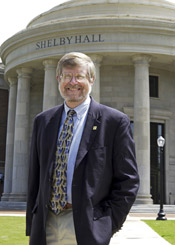
TUSCALOOSA, Ala. – The University of Alabama Board of Trustees has appointed Dr. David A. Dixon to the Robert Ramsay Chair of Chemistry in UA’s College of Arts and Sciences.
The Ramsay Chair was established in 1956 with gifts from Erskine Ramsay of Birmingham, made in memory of his late father, Robert Ramsay. The Ramsay Chair is designated for a nationally and internationally recognized teacher-scholar with an excellent track record for publishing, external funding and teaching.
Dixon comes to the University from the Pacific Northwest National Laboratory where he served as a Battelle Fellow.
His area of expertise is in the application of the techniques of numerical simulation and high performance computing to the solution of complex chemical problems, with a focus on catalysis and environmental science including actinide chemistry, atmospheric chemistry, hydrogen storage, biochemistry, and fluorine chemistry.
Complex chemical experiments can be expensive, time consuming to conduct, and, sometimes, even dangerous. Computer simulation of such experiments enables researchers to test theories and solutions in a “virtual” laboratory before moving to the real-world work.
“Numerical simulation and high performance computing are critical areas of expertise for any advanced research program,” said Dr. Robert Olin, dean of the College. “Professor Dixon brings the highest credentials to the College and The University of Alabama.
“We are excited that he has joined our research faculty as the Ramsay chairholder in the department of chemistry,” Olin said. “We are confident that his contributions will be invaluable to ongoing and new research areas in the College.”
Dixon has held appointments as associate director of theory, modeling and simulation in the William R. Wiley Environmental Molecular Sciences Laboratory, a U.S. Department of Energy national user facility at Pacific Northwest National Laboratory in Richland, Wash., as research fellow and research leader at the DuPont Central Research and Development Laboratories in Wilmington, Del., as assistant professor of chemistry at the University of Minnesota, as a visiting research associate at the California Institute of Technology, and as a Junior Fellow, Society of Fellows, at Harvard University.
His work has been recognized with numerous fellowships and awards including the 1989 Leo Hendrik Baekeland Award of the American Chemical Society given for outstanding accomplishment under the age of 40, the 2003 American Chemical Society Award for Creative Work in Fluorine Chemistry, as a 2002 Fellow of the American Physical Society, and as a 1994 Fellow of the American Association for the Advancement of Science.
Dixon’s research has resulted in the publication of more than 400 research papers in prestigious journals and the presentation of more than 200 invited lectures at major universities and public and private laboratories throughout the world, and three significant patents.
Dixon received a bachelor’s degree in chemistry from the California Institute of Technology in 1971 and a doctoral degree in physical chemistry from Harvard University in 1976.
Contact
Rebecca Paul Florence, Director of College RelationsJody Herrin, 205/348-8663